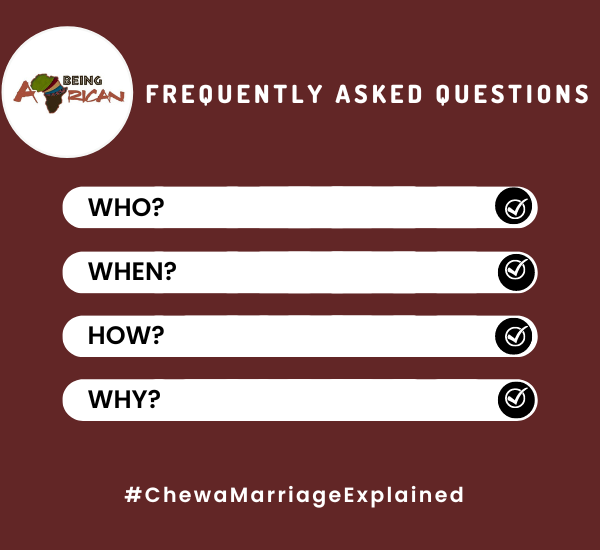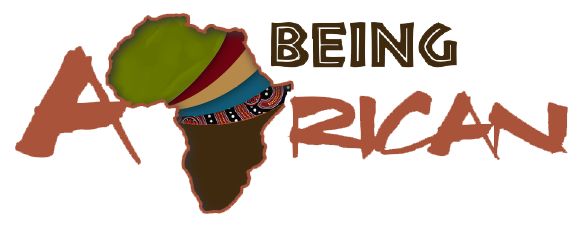
Chewa Frequently Asked Questions
Key roles explained
- ‘Mtsibweni’ or Malume
- Azakhali
- Ankhoswes (mediators)
‘Mtsibweni’ or Malume
Who is ‘Mtsibweni’ or Malume?
- ‘Mtsibweni’ or malume is responsible for providing advice and counseling, providing the needs to the boy as well as monitoring his growth throughout the marriage process.
What is ‘Mtsibweni’ or Malume’s role?
- Among the Chewa ‘mtsibweni’ or malume has the responsibility to oversee the upbringing of his nephew and make sure that he is growing according to Chewaculture and is taking full responsibility within the family as he grows up.
Who can take the role of ‘Mtsibweni’ or Malume?
- Usually the groom’s maternal uncle; head of the family
- ‘Mtsibweni’ or malume can be one of the groom’s uncles
- Can be from immediate or extended family
What is Azakhali‘s role?
- She is responsible for giving her advice, making sure the girl is provided with her needs.
- She also monitors her growth and actions in the community.
Who can take the role of Azakhali?
- Usually the bride’s Aunt takes on the responsibility of Azakhali.
Ankhoswes (mediators)
Who is Ankoswe?
- In the Chewa culture, Ankhoswes control of all family matters is with the malume (uncle).
What is Ankhoswe ‘s role?
- The ankhoswe’s role is to make sure all is going on well in the marriage, and if there are issues, one has to report to his or her uncle not parents.
- Parents just receive reports on issues already resolved by the Ankhoswe.
Who can take the role of Ankoswe?
- The uncles are the ankhoswes (mediators) in Chewa marriages.
What is ”kusunga mtundu” in the Chewa culture?
- Kusunga mtundu is a custom in the Chewa culture where clan members are not allowed to marry members outside their own clan.
- Through this belief, it is believed that relations are kept close.
Why is the woman expected to turn down the first marriage proposal from the man?
- The girl has to delay acceptance so that she is viewed as “strong”, someone not desperate, someone not simple, and someone men can fight for.
- Accepting at initial proposal is a sign of weakness in the girl. It signals she is “cheap”.
- Furthermore, it also shows that the man is resilient and strong as he is persistent in pursuing the girl . It assures the couple that even if they face challenges in marriage, both will be resilient to handle issues.
Chikole
What is Chikole?
- Chikole is a physical gift given to the woman to show to others that she is engaged).
- Popular items used as chikoleinclude mikanda (jewelry), a piece of cloth which women usually use to wrap over their head and other material things.
Why is Chikole necessary?
- Chikole is an indicator that the man is serious about marrying the girl and prevents the girl from being approached by other men for marriage proposals.
- When the lady is approached by another man, she shows the chikoleand it blocks the man from continuing with his advances.
What is tete’s role on the groom’s side of the family?
- Supports and and gives advice to the groom
- Not all families have a tete-aunt accompanying the groom’s team
Kugwira chikamwini (for the man)
What is Kugwira chikamwini?
- Kugwira chikamwini a cultural practice where the groom-to-be spends one or two months at the home of his would-be parents-in-law working hard, participating in all family chores.
Why is it necessary? Is this the correct word?
- This is more like a probation period since parents assess the man if he will be able to take care of their daughter, more especially feeding and dressing her.
- Furthermore, this is an opportunity for the parents to appreciate the behavior of the young man.
What family chores does the man do during Kugwira chikamwini?
- The man participates in many chores at the family such as;
- Farming
- Hunting
- Making tools that are usually used at the household, e.g. mats.
Chitengwa (for the woman)
What is Chitengwa?
- Kugwira chikamwini a cultural practice where the bride-to-be spends one or two months at the home of his would-be parents-in-law working hard, participating in all family chores.
Why is it necessary?
- This is more like a probation period since parents assess her potential in supporting the man if they get married.
- Furthermore, this is an opportunity for the parents to appreciate the behavior of the young woman.
What family chores does the man do during Kugwira chikamwini?
- The man participates in many chores at the family such as;
- Kusinja, kukonola, kupanga mphale (processing flour manually)
- Cooking
- Other similar household chores.
What is Chiwongo ?
- Chiwongo is the fee or dowry which man pays the girl’s uncle to marry her.
What is the significance of Chiwongo?
- It is not a payment for marrying the girl, but more like a token of appreciation to the parents of the girl that they raised their child well and that the young man has now found a good wife in their daughter.
Who is Chiwongo paid to?
- Chiwongo is usually charged by the uncle of the girl.
What constitutes Chiwongo?
- It ranges from five goats to more.
- Charges are also dependent on the behavior of the girl. If she is a virgin and has good behavior and is a hard worker, the charges are much higher.
On the contrary, if the girl is lazy and has a bad history, the charges are lower.
Mwambo wa M’banja
What is Mwambo wa M’banja ?
- Mwambo wa M’banja means family life lessons.
Who is involved in the process ?
- Uncles or aunties of the two newly-weds – The process is led by the uncles and Aunts.
- Ntchembere – elderly women
- Fellow men in the community
What in involved in the process?
- The man is engaged by fellow men on how he can serve well his wife
- The girl also participates in similar sessions with older women
- The elderly woman, with the help of the bride also secretly carry out an impotency test on the groom.
